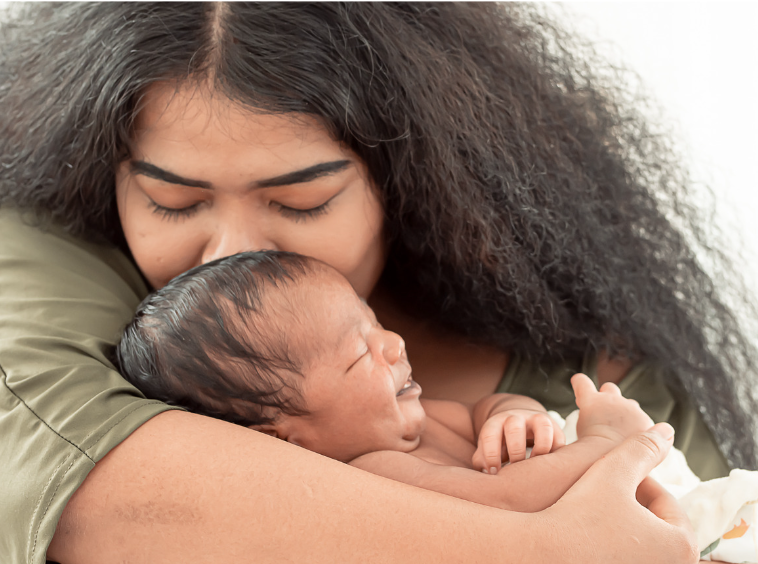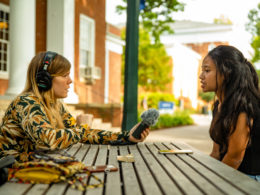Regardless of background or socioeconomic status, first-time parents all experience similar challenges and encounter similar questions: How do I bond with my child? Am I doing enough to support their development? Are they prepared for early childhood education?
Luckily, parents don’t have to navigate this alone.
Home visiting connects pregnant and parenting families to a qualified support professional who provides custom, family-centered coaching and guidance through pregnancy and the early stages of childhood (0-5). It remains one of Virginia’s most effective strategies for strengthening communities by supporting healthy birth outcomes, building strong and nurturing relationships, increasing family self-sufficiency and ensuring children enter school fully prepared to succeed.
Early Impact Virginia (EIV) is the statewide, nonprofit alliance helping to ensure all pregnant and parenting families have access to high-quality, early childhood home visiting, how and when they choose. It supports more than 70 localized programs, which serve nearly 7,000 families each year.
In part one, we dove into the impact and connection that makes home visiting special for so many Virginia families. Keep reading to hear from local program leaders about the needs and challenges facing home visitors, and how you can support efforts in your community.
- Healthy Families Central Virginia operates under HumanKind, a nonprofit human services organization serving Virginians since 1903. Healthy Families works with more than 120 families in and around the Lynchburg area per year. Ashley Graham, chief operating officer at HumanKind and former director of Healthy Families, supervises the program.
- Parents as Teachers (P.A.T.) of Greater Williamsburg is housed under Child Development Resources (CDR), a nonprofit agency serving prenatal and young families in the Williamsburg area. Amanda Wheeler, a licensed clinical social worker, and her team serve 60-70 families each year.
- Northern Virginia Family Service (NVFS) Healthy Families works to promote positive, nurturing, responsive parenting; improve child health and development; promote school readiness; and prevent child abuse and neglect across Northern Virginia. The program supports close to 700 families each year and is led by Nanci Pedulla.
“We can change the world. One relationship, one family, one community at a time.”
Home visiting is a multi-generational intervention. Parenting is learned behavior, and parents consciously and unconsciously choose what to pass on to their children. The opportunity to transform communities for future generations begins with families today.
Relying on community support
Volunteers and individual supporters are key to the success of local programs, and the best way for people to get involved is to learn about the work and see it in action.
Many programs offer observation opportunities – allowing folks to go into homes and see firsthand the value of home visiting. From there, individuals can reach out to local representatives to urge support and make referrals to friends and families who may benefit.
Programs are always accepting donations and often are looking for volunteers to help work events. For the most active advocates, nonprofits need engaged members on advisory boards. Find your local program here, and contact them directly to get involved.
Rebuilding the workforce

When programs are operating at full capacity, they’re able to add enhancements to the home visiting model and offer specialized support like mental health counseling through additional staff certifications and training. The more programs can pour into their home visitors, the more parents can reap from the experience.
A proven pathway to attracting new home visitors: parents who have graduated from the program. There are countless stories of mothers wanting to give back to the program that helped them and share their newfound knowledge with other parents in the community.
Bringing it full circle, home visiting is a part of the workforce solution. By strengthening families and ensuring the long-term health and well-being of children, early childhood development brings long-term benefits, like higher graduation rates and earning potential.
Investing in families’ futures
While programs need the support of the local community to be successful, the Commonwealth of Virginia provides the primary, “stable” source of funding. But what was once considered the most stable route is anticipating major deficits – putting communities at risk of losing service.
Since 2008, Virginia has used discretionary Temporary Assistance to Needy Families (TANF) to fund a variety of social service programs like home visiting. A report recently revealed TANF funding has become fully obligated and the current allocation will result in a multi-million-dollar deficit by FY 25. To keep home visiting programs intact, the General Assembly will need to dedicate $13.1 million from the budget to make up for the TANF losses.
With reduced staffing and the threat of budget cuts, programs will continue to work hard to meet benchmarks and provide quality assistance, but on a much smaller scale. Right now, less than 10% of eligible Virginia families are getting the support they need.
“It isn’t normalized, and it should be.”
Resources are limited, but if Graham, Wheeler and Pedulla had it their way, every parent would have access to some level of family support – whether that means a regular home visit or simply a number to text when looking for resources.
The misperception that home visiting is only for families in poverty or dealing with traumatic situations couldn’t be further from the truth. Parenting inherently comes with its challenges, regardless of socioeconomic status, background or circumstance. Voluntarily asking for support shows that parents want to learn and do what’s best for their children, even if it means admitting they don’t know all the answers, all the time.
“We know that parents want to be the best parents they can be for their children,” Pedulla said. “We have our expertise, but we’re not coming in there telling families what to do, how to do it. We’re offering resources, partnering with the parents and really respecting where they’re coming from and meeting them where they’re at.”

“When it comes to parenting, we are often quick to judge,” said Laurel Aparicio, director of Early Impact Virginia, the statewide alliance of home visiting programs. “We can have a lot more empathy for families and remember what it was like [to raise a child for the first time]. When parents ask for help – it’s a huge sign of strength.”
Learn more about home visiting and EIV, here.
At the date of publication, Early Impact Virginia is a client of The Hodges Partnership.










